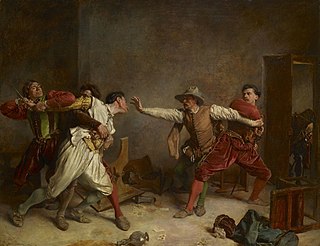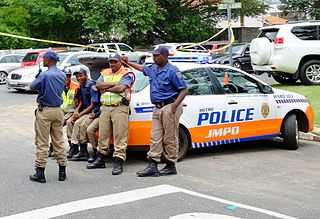Related Research Articles

An assault is the act of inflicting physical harm or unwanted physical contact upon a person or, in some specific legal definitions, a threat or attempt to commit such an action. It is both a crime and a tort and, therefore, may result in criminal prosecution, civil liability, or both. Generally, the common law definition is the same in criminal and tort law.

In many legal jurisdictions related to English common law, affray is a public order offence consisting of the fighting of one or more persons in a public place to the terror of ordinary people. Depending on their actions, and the laws of the prevailing jurisdiction, those engaged in an affray may also render themselves liable to prosecution for assault, unlawful assembly, or riot; if so, it is for one of these offences that they are usually charged.
Defamation is the oral or written communication of a false statement about another that unjustly harms their reputation and usually constitutes a tort or crime. In several countries, including South Korea, a true statement can also be considered defamation.
Actus reus, sometimes called the external element or the objective element of a crime, is the Latin term for the "guilty act" which, when proved beyond a reasonable doubt in combination with the mens rea, "guilty mind", produces criminal liability in the common law−based criminal law jurisdictions of England and Wales, Canada, Australia, India, Kenya, Pakistan, Philippines, South Africa, New Zealand, Scotland, Nigeria, Ghana, Ireland, Israel and the United States of America. In the United States, some crimes also require proof of attendant circumstances and/or proof of a required result directly caused by the actus reus.
Perverting the course of justice is an offence committed when a person prevents justice from being served on him/herself or on another party. In England and Wales it is a common law offence, carrying a maximum sentence of life imprisonment. Statutory versions of the offence exist in Australia, Canada, Hong Kong, Ireland, and New Zealand. The Scottish equivalent is defeating the ends of justice, while the South African counterpart is defeating or obstructing the course of justice. A similar concept, obstruction of justice, exists in United States law.
Culpable homicide is a categorisation of certain offences in various jurisdictions within the Commonwealth of Nations which involves the illegal killing of a person either with or without an intention to kill depending upon how a particular jurisdiction has defined the offence. Unusually for those legal systems which have originated or been influenced during rule by the United Kingdom, the name of the offence associates with Scots law rather than English law.
The Civil Rights Congress (CRC) was a United States civil rights organization, formed in 1946 at a national conference for radicals and disbanded in 1956. It succeeded the International Labor Defense, the National Federation for Constitutional Liberties, and the National Negro Congress, serving as a defense organization. Beginning about 1948, it became involved in representing African Americans sentenced to death and other highly prominent cases, in part to highlight racial injustice in the United States. After Rosa Lee Ingram and her two teenage sons were sentenced in Georgia, the CRC conducted a national appeals campaign on their behalf, their first for African Americans.
Group Areas Act was the title of three acts of the Parliament of South Africa enacted under the apartheid government of South Africa. The acts assigned racial groups to different residential and business sections in urban areas in a system of urban apartheid. An effect of the law was to exclude people of color from living in the most developed areas, which were restricted to Whites. It required many people of color to commute large distances from their homes to be able to work. The law led to people of color being forcibly removed for living in the "wrong" areas. The majority that was people of color, were given much smaller areas to live in than the white minority who owned most of the country. Pass Laws required people of color to carry pass books and later 'reference books', similar to passports, to enter the 'white' parts of the country.

Lesbian, gay, bisexual and transgender (LGBT) people in South Africa enjoy the same rights as non-LGBT people. South Africa has a complex and diverse history regarding the human rights of LGBT people. The legal and social status of between 400,000–over 2 million lesbian, gay, bisexual, transgender and intersex South Africans has been influenced by a combination of traditional South African mores, colonialism, and the lingering effects of apartheid and the human rights movement that contributed to its abolition.

Edwin CameronSCOB is a retired judge who served as a Justice of the Constitutional Court of South Africa. He is well known for his HIV/AIDS and gay-rights activism and was hailed by Nelson Mandela as "one of South Africa's new heroes". President Ramaphosa appointed him as Inspecting Judge of Correctional Services from 1 January 2020 and in October 2019 he was elected Chancellor of Stellenbosch University.

The Sultanate of Zanzibar, also known as the Zanzibar Sultanate, was a state controlled by the Sultan of Zanzibar, in place between 1856 and 1964. The Sultanate's territories varied over time, and at their greatest extent spanned all of present-day Kenya and the Zanzibar Archipelago off the Swahili Coast. After a decline, the state had sovereignty over only the archipelago and a 16-kilometre-wide (10 mi) strip along the Kenyan coast, with the interior of Kenya constituting the British Kenya Colony and the coastal strip administered as part of that colony de facto.

Law enforcement in South Africa is primarily the responsibility of the South African Police Service (SAPS), South Africa's national police force. SAPS is responsible for investigating crime and security throughout the country. The "national police force is crucial for the safety of South Africa's citizens" and was established in accordance with the provisions of Section 205 of the Constitution of South Africa.
Barr v. City of Columbia, 378 U.S. 146 (1964), is a United States Supreme Court decision that reversed the breach of peace and criminal trespass convictions of five African Americans who were refused service at a lunch counter of a department store. The Court held that there was insufficient evidence to support the breach of peace convictions, and reversed the criminal trespass convictions for the reasons stated in another case that was decided that same day, Bouie v. City of Columbia, which held that the retroactive application of an expanded construction of a criminal statute was barred by due process of ex post facto laws.

The courts of South Africa are the civil and criminal courts responsible for the administration of justice in South Africa. They apply the law of South Africa and are established under the Constitution of South Africa or under Acts of the Parliament of South Africa.

A sodomy law is a law that defines certain sexual acts as crimes. The precise sexual acts meant by the term sodomy are rarely spelled out in the law, but are typically understood by courts to include any sexual act deemed to be "unnatural" or "immoral". Sodomy typically includes anal sex, oral sex, and bestiality. In practice, sodomy laws have rarely been enforced against heterosexual couples, and have mostly been used to target homosexual couples.

The Criminal Procedure Act, 1977 is an act of the Parliament of South Africa that governs criminal procedure in South Africa's legal system. It details the procedure for the whole system of criminal law, including search and seizure, arrest, the filing of charges, bail, the plea, the testimony of witnesses and the law of evidence, the verdict and sentence, and appeal.
Section 20A of the Immorality Act, 1957, commonly known as the "men at a party" clause, was a South African law that criminalised all sexual acts between men that occurred in the presence of a third person. The section was enacted by the Immorality Amendment Act, 1969 and remained in force until it was found to be unconstitutional in 1998 by the Constitutional Court in the case of National Coalition for Gay and Lesbian Equality v Minister of Justice.
South African criminal law is the body of national law relating to crime in South Africa. In the definition of Van der Walt et al., a crime is "conduct which common or statute law prohibits and expressly or impliedly subjects to punishment remissible by the state alone and which the offender cannot avoid by his own act once he has been convicted." Crime involves the infliction of harm against society. The function or object of criminal law is to provide a social mechanism with which to coerce members of society to abstain from conduct that is harmful to the interests of society.
S v Vika, an important case in South African criminal law, was heard on May 12, 2010. MM Xozwa, instructed by the Justice Centre, Grahamstown, appeared for the appellant; H. Obermeyer appeared for the State. The case was an appeal against sentence imposed in a regional court.

The National Forensic DNA Database of South Africa (NFDD) is a national DNA database used in law enforcement in South Africa. The Criminal Law Amendment Act No. 37 of 2013 provides for the expansion and administration of such a database in South Africa, enabling the South African Police Service (SAPS) to match forensic DNA profiles derived from samples collected at crime scenes with forensic DNA profiles of offenders convicted of, and suspects arrested for, offences listed in a new Schedule 8 of the amended Criminal Procedure Act of 1977.
References
- S v Ingram 1999 (2) SACR 127 (W).